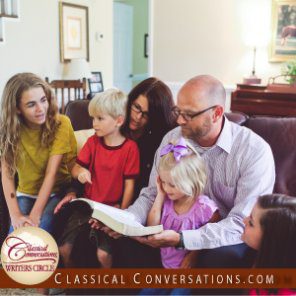In my first article on this topic I focused on the overarching vision of Classical Conversations which is often delineated by the alliterative, threefold focus: Classical Christian Community. This article will focus on community as it relates to each of the three stages of learning: grammar, dialectic, and rhetoric.
Is the art of “grammar” better in community? You bet. Listening to lectures, watching DVDs, memorizing definitions, learning your timeline song, and practicing Latin flash cards can all be done via different media that can be ordered online, shipped directly to your doorstep, and enjoyed in the privacy of your own home. This is a great blessing. We are actually homeschoolers. The work happens at home because parents will be the best educators for their young home scholars. But why stop there?
Teaching your students at home and meeting together with other homeschoolers to share the joys and griefs of this journey are not two mutually exclusive acts. Rugged, individualistic homeschooling cannot produce the number of benefits that homeschooling together can. It will be better in community. It will be better for your kids. It will be better for you.
Is the art of “dialectic” better in community? As the art of grammar can be practiced at home, so can the art of dialectic. If we are good readers, then we are always asking questions of the text. We must endeavor to suspend judgment until the end of the text in order to judge rightly. I have heard this called being ‘academically honest’ with the text. At the same time, words only have meaning as they are sifted and sorted through the reader’s present paradigm of the world. Even one who is attempting to be ‘academically honest’ must recognize his present personal biases. As a reader, I am judging every sentence while I am suspending judgment of the entire argument. A good reader is always reading dialectically.
In like manner, a good writer is attempting to sift and sort his own thoughts. If a writer is always concerned with his audience, then there is another imaginary person with every writer. An assertion always requires a consideration of possible refutations. This allows the writer to effectively communicate with the future reader, who is ideally attempting to be academically honest. But why stop there?
As both a reader and writer, my personal dialectic will come to a grinding halt long before the depths of any subject have been thoroughly mined. The lenses through which I see and interpret the world, i.e. my worldview, will eventually inhibit, instead of promote, a fully mature dialectic. To begin to plumb the depths of the glories of the handiwork of God, I am going to need another image-bearer alongside me. I need help. I need a conversation.
Is the art of “rhetoric” better in community? Actually, it is almost impossible to practice the art of rhetoric in solitude, even with a mirror. I can practice my speech all day long in front of the mirror, and I have never done more than rehearse. Public speaking requires a public. Being a “persuader” requires a “persuadee.” Like an athlete, you have to be in a real game. You can practice for years at home, but you will never come close to your potential until you are up against another athlete. A real game requires people—several people practicing the same sport that you are practicing, working with you and against you to win the same game that you are trying to win. In like manner, you have to do more than practice in front of a mirror to master the art of rhetoric. Real rhetoric requires people—several people aimed at the same truth you are aiming at, and eventually, several people that are not. Real rhetoricians require “chutzpah,” and that does not come from seeing yourself in the mirror. Real rhetoric requires the sharpening of iron by iron.
Classical Conversations is a classical, Christian, community. In our continuing endeavor to educate our children, not a single one of the three C’s is negotiable. They are like legs on a stool—two just do not cut it. We must be classical: looking back in order to move forward; we must be Christian: taking every thought captive to the obedience of Jesus the Messiah; we must do this together—in community—if we are ever to attain to this holy and noble calling.




